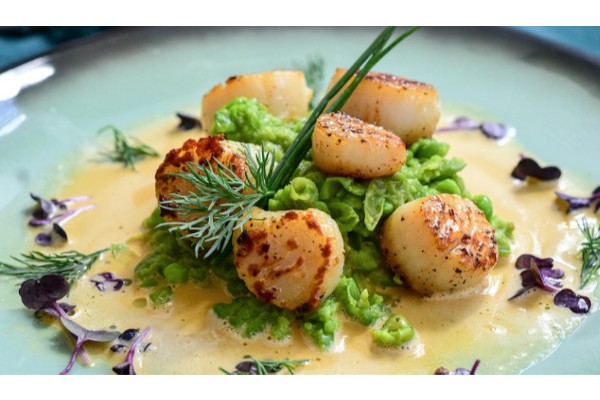Yes! Scallops, a great source of protein, magnesium, and potassium, can be fed to dogs in moderation. Before giving your dog scallops, make sure they are fully cooked, not just fried.
Table of Contents
Are Scallops Safe For Dogs?
Scallops that have been cooked are safe for dogs to consume in moderation. Magnesium, potassium, protein, and phosphorus are among the vitamins and minerals that scallops contain and can be beneficial to the health of your pet. Dogs should preferably be given small amounts of plain, cooked scallops in their shell. Butter, oil, and seasonings can upset your dog’s stomach, and raw seafood may carry dangerous bacteria. To avoid choking, it’s imperative to give your dog small bites of scallops outside of the shell.
Before giving your dog this seafood, talk to your veterinarian because many dog breeds could have allergic reactions to scallops. You can give your pet scallops in small doses to observe reactions and potential side effects if your dog has previously handled shellfish without incident or once your veterinarian gives you the all-clear. This food may not agree with the digestive system of your dog if diarrhea or an upset stomach develops.

4 Health Benefits Of Scallops For Dogs
Scallops are high in nutritional value, and dog owners may feed their dog scallops for the following health benefits:
1. Magnesium
This necessary mineral supports heart and nerve function and is fantastic for your dog’s health.
2. Potassium
In order for your dog’s nervous system to transmit signals between different organs, potassium is essential.
3. Protein
Seven grams of protein are present in one ounce of scallops, which helps to keep your dog’s muscles strong and active by boosting its skeletal system.
4. Phosphorus
Phosphorus, a mineral found in scallops, is crucial for preserving the health of dog bones and teeth.
How To Feed Scallops To Your Dog
Dogs can eat this type of delicious shellfish, but there are some factors to consider before you feed scallops to your pet:
- 1. Feed your pet plain scallops. Scallops are delicious when combined with seasonings, onion, and garlic, but only for humans. Scallops that are cooked but plain should be served to your dog because these toppings will upset their digestive system.
- 2. Cook without additional fats. Your dog may develop pancreatitis from eating fatty foods. To put your dog’s overall health first, keep the scallops straightforward.
- 3. Thoroughly bake the scallops. To prepare scallops for your dog, bake or grill them. Shellfish poisoning from eating raw seafood is a possibility. Roundworms, tapeworms, and other harmful viruses and bacteria can all be found in raw scallops in addition to Salmonella. Dogs’ sensitive metabolism makes it harder for them to process these harmful bacteria, which can cause stomach discomfort. Save yourself the butter and oil by not frying the scallops.
- 4. Remove the shells. The scallop shell is not edible and is choking-hazardous. Before giving your dog any of this food, make sure to properly dispose of it.
- 5. Cut into small pieces. Because scallops can be quite large, you should dice them up and serve them in smaller pieces to avoid choking hazards. The cooked scallops can be added to the dog food as a garnish or offered as a treat all by themselves.
- 6. Serve the scallops once they’ve cooled. Let the scallops cool first to avoid your dog’s mouth getting burned. Your dog might be eager to try this new food.
Can Dogs Consume Fried Scallops?

In contrast, dogs shouldn’t consume fried scallops. Fried scallops are unhealthy for your dog’s health in addition to being greasy. Oily food should not be included in your dog’s diet because it is very fatty.
Your dog might develop an upset stomach and experience discomfort the rest of the day after eating some fried scallops. Additionally, if you’re not careful and your dog consumes a lot of fried scallops, it might affect his or her pancreas.
Consuming a lot of fried food increases the possibility that your canine companions will experience pancreatitis or pancreatic inflammation. This causes the organ in your dog to start producing harmful enzymes that can damage the dog’s intestines.
Try to avoid giving your dog fried scallops as a result.
Never Feed Raw Scallops To Your Dog
As we can see, dogs shouldn’t eat scallops if they are raw or only partially cooked. Feed only fully cooked scallops to your dog. Scallops should never be eaten raw.
Bacteria, parasites, and viruses that can lead to chronic diseases in dogs and puppies may be present in raw scallops. Chronic diseases our puppies and dogs can get from eating raw Scallops include:
Acute abdominal pain
Dogs may experience stomach pain from parasites like trematodes and tapeworms. It’s best to avoid giving your dog raw scallops because these parasites are frequently found in raw seafood.
Some people advise freezing the raw scallops in the hopes that the microorganisms will perish from the cold; however, when it comes to our dog’s health, it’s best to err on the side of caution and simply fully cook the scallops before feeding them to your pups.
Vomiting
When your dog consumes raw seafood that has been contaminated with parasites, fungi, bacteria, and viruses, it’s normal for them to throw up. It’s the body’s natural method of attempting to get rid of toxins.
Cholera
Vibrio cholera, the cause of cholera, may be present in raw scallops. Your K9 companions may experience extremely unpleasant diarrhea if they consume a lot of raw scallops without your knowledge.
Your dog may experience severe dehydration due to the water loss that diarrhea can cause to the body.
Gastroenteritis
Dog gastroenteritis can be brought on by viruses, bacteria, fungi, and parasites. Raw scallops contain all of these.
Because the digestive tract inflames when you have gastroenteritis, it is very uncomfortable and painful. Dogs are prone to vomiting, violent diarrhea, and stomach pain.
Meningitis
Meningitis in dogs is a relatively uncommon condition, but some dog breeds are more susceptible to it than others. Beagles, German Shorthaired Pointers, and Bernese Mountain Dogs are the three canine breeds mentioned.
Fungi, viruses, and bacteria are frequently responsible for meningitis. Consuming raw scallops that have been exposed to contaminated sewage water may contain bacteria and viruses that cause canine meningitis.
Septicemia
Dogs who consume raw scallops may be at risk of contracting viruses like Vibrio cholerae and Vibrio vulnificus. These viruses can cause blood poisoning, which can result in a high fever and extremely low blood pressure in dogs. They can also cause blood poisoning in humans.
Call your veterinarian right away if you think your canine companions aren’t feeling well after unintentionally ingesting raw scallops or if they might have septicemia. These viruses must receive immediate medical attention or your dog may not survive.
Viral hepatitis
The Hepatitis A virus may be present in scallops grown in unsanitary conditions or close to sewage water. Dogs may contract the virus if they consume raw scallops that have been exposed to viral hepatitis.
Therefore, if you have puppies, you should be especially careful when feeding them scallops. Before giving the scallops to your dogs, make sure they are fully cooked and not raw.
Keep in mind that you have no control over the environment the scallops came from before they entered your kitchen. The sea, ocean, or environment may expose the scallops to the aforementioned parasites, bacteria, and viruses. Even during storage, handling, and shopping for groceries, they may contaminate the scallops.
In Conclusion
Yes, serving your dog plain, cooked scallops is a tasty and healthy treat. When feeding them in moderation, you shouldn’t have anything to worry about as long as you aren’t frying them or adding extra ingredients!
This article should not be interpreted as medical or veterinary advice since we are not veterinarians. Please get in touch with your neighborhood veterinarian if you have any questions about the diet or health of your pet.
